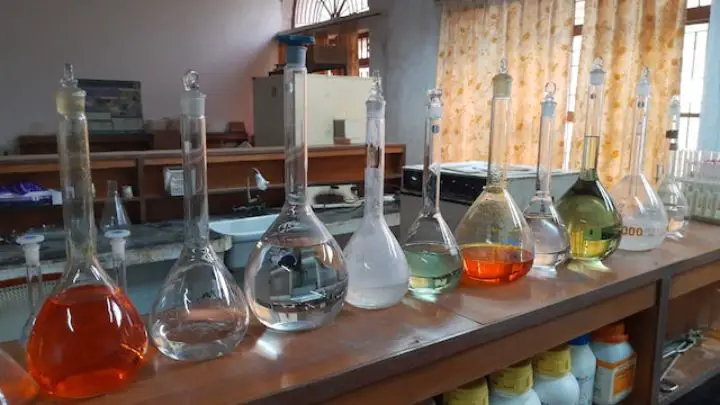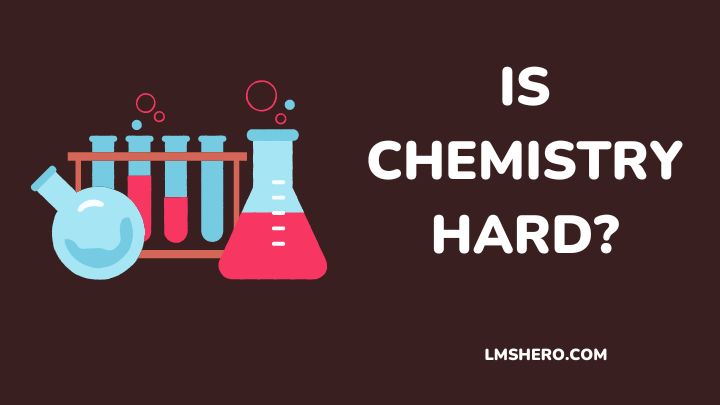In high school, chemistry is one of the subjects many students are really afraid of, even before the first day of class. And this is due to what they have heard from other students. Hence, it raises the question: is chemistry hard?
Simply put, yes, chemistry is hard, for so many reasons, when compared to other science subjects. And it is a compulsory subject for all science students in high school.
Almost every student finds chemistry difficult, and the most common reason is that they do not approach it the right way. Chemistry is a progressive subject, which means you can barely understand the later topics if you can’t comprehend the beginning.
In this article, I will examine the reasons why chemistry is hard and the different ways to learn chemistry.
Let’s get started.
Why is chemistry hard?

One of the primary reasons chemistry is so hard is due to the constant development of topics, which is different from other science subjects. And before you can fully comprehend some topics, you must first understand some.
This is not about memorization, but problem solving, logic, and mathematics. Just like learning a language, chemistry is progressive. You learn the alphabet, then move on to spell words, learn how to write the words, and finally write logical sentences.
This is the same for chemistry, which makes everything you study at the start come in handy later on.
Furthermore, chemistry is one of just a few scientific fields that is both logical and abstract. It studies electrons, what they do, and how they are likely to behave.
Effective strategies for learning chemistry
Most students often find chemistry hard as a result of approaching it the wrong way. The following are some effective ways to study and learn chemistry:
1. Understand the basics first
While chemistry is an evolving and progressive discipline, the basics you learn at the outset of the course are important to your success in later chapters.
Thus, it is essential that you pay close attention, and comprehend the very basics of chemistry.
2. Always write and review your notes before every class
While attending and paying attention in classes is important, it is not just enough. However, you must take copious, understandable notes that will help you understand the topics being taught.
Taking notes also makes you write things down, like formulae and equations while studying. It will be much simpler to recall and comprehend after you have written them down. The following are the reason why you should take notes:
- Taking notes and then reviewing them will help you assess what you do and do not understand
- Taking structured notes can help you to efficiently review lectures and prepare for tests
- Taking notes will allow you to engage in study groups. The better your notes, the more effectively you will engage and contribute to your study group
Thus, as a student, you are expected to go home, review your class notes, attempt the assignments, and come to class the next week with any questions you have from the previous lecture.
3. Practice every day
Daily practice is one of the best ways to learn and study chemistry. Hence, your daily study routine should include solving problems, working with formulas, etc.
If you want to learn and stay at the top of your game, you should spend about an hour a day studying it. Review and work through the practice problems on past questions, to see how well you understand and know chemistry.
If you make a mistake on a problem, work it out again on paper until you get it right. Make sure you know why each step of the problem needs to be done.
Keep doing this until you fully understand what is being taught.
4. Make use of flashcards
Chemistry is filled with scientific symbols, formulae, and jargon that must be remembered and accurately comprehended. Hence, flashcards are perfect for learning and memorizing chemical symbols, formulae, and even the periodic table of elements.
5. Join a study group
A well-organized study group is an excellent approach to handling any difficult topic in chemistry.
You can use study groups to share your insights, discuss ideas, clarify difficult concepts to one another, teach what they’ve learned, compare notes, study for examinations, and cover additional material.
The following are some tips for building productive study groups:
- Limit your group size to no more than six persons
- To participate in group study sessions, all individuals must be prepared
- Include people who are committed to their achievement as well as the success of the group as a whole
- Schedule weekly group study sessions at the same time and location
- Keep your study sessions to 2 to 3 hours
- Study as a group in a distraction-free atmosphere
6. Break huge tasks into pieces
Learn chemistry more effectively by dividing the topic into manageable chunks. While this may seem slow and boring at first, it will eventually help your retention of course material.
When you’ve gotten a firm grasp on one idea, it’s time to move on to the next. You might be surprised to find that larger ideas are considerably less daunting to learn and master after you have a firm grasp of the fundamentals.
7. Focus on understanding, not grade
Mastering chemistry calls for undivided attention. Hence, focusing too much on your grade can prevent you from gaining any real understanding of the subject matter.
Your grade in chemistry will improve if you put in the effort to study the material. Not taking the time to do anything properly can only lead to frustration.
What you take away from your education is what matters in the long run. You may improve your GPA by studying hard.
FAQs
What is the most difficult science?
Physics is generally regarded as the most difficult science.
Physics contains a lot of complicated mathematical material, a component that most students struggle with.
Is a degree in chemistry worth it?
Yes, chemistry graduates can contribute to a variety of fields, from the development of medicines to criminal investigations.
Where do chemistry graduates work?
Among other fields, chemistry graduates work in healthcare, pharmaceuticals, IT, finance, and management. Some students also pursue additional study or research to later become professors.
Conclusion: Is chemistry hard?
Chemistry is widely regarded as one of the most challenging science courses both in high school and college.
However, just like other science disciplines, the key to learning and understanding chemistry is to constantly study and give it your best each time.
However, you may lessen the stress of your chemistry lessons by preparing yourself and reading ahead of every class, writing and reviewing your notes, always attending classes, joining study groups, and so on.
I hope you found this article interesting. You can also read to know why being a chemistry major is a good career move.
Thanks for reading.






